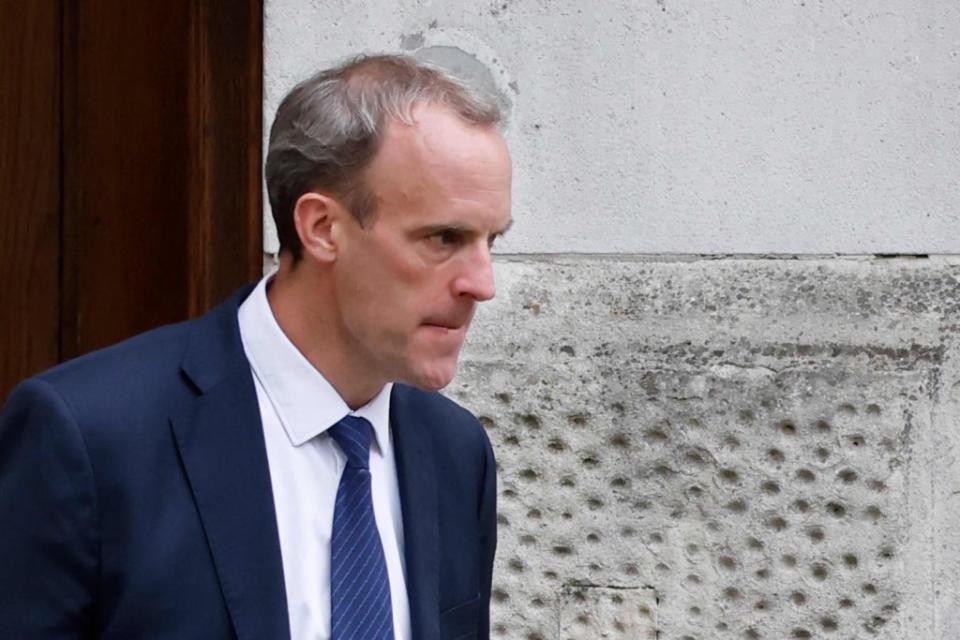How does Boris Johnson’s cabinet sleep at night with what’s going on in Afghanistan?

There’s nothing inherently wrong with deciding on a career in politics at a young age. It’s not the norm, but on the basis that your intentions are honourable (making a difference, say, or public service) it’s OK and ’twas ever thus. But something’s changed of late – we find ourselves not only with a prime minister who lacks any form of moral compass and has a loose affinity with the truth, but with a cabinet dominated by sycophants and second-raters.
Despite an inquiry last year finding that she had bullied her staff, home secretary Priti Patel didn’t even contemplate resigning. Neither did Robert Jenrick, the communities secretary, in the wake of a number of gross errors of judgement.
Dominic Raab has escaped justified calls for his resignation, after it emerged that he had been lounging on the beach as a catastrophic failure of foreign policy galloped apace in Afghanistan. He was considerably keener to get a holiday pass from Boris Johnson than to call his Afghan counterpart.
Compare and contrast – as others have said – the actions of Lord Carrington after Argentina invaded the Falkland Islands. Peter Carrington resigned as foreign secretary, taking responsibility for his department’s failure to heed the warnings leading up to events in late March and early April 1982.
Hansard records that the then defence secretary also offered to resign, but Margaret Thatcher refused the request. Compare and contrast, also, Thatcher’s handling of the ensuing crisis with the behaviour of Johnson. Thatcher immediately sought and got international support, notably from the UN.
She consulted her cabinet – not merely listening to all views, but positively courting them. Thatcher didn’t hesitate to assemble parliament – on a Saturday. Despite her faults, especially towards the end of her tenure, Thatcher appointed her cabinet ministers based on merit, and happily included both Ken Clarke and Keith Joseph from opposite wings of the Conservative Party. Thatcher expected dissent and rigorous debate.
Johnson has chosen a cabinet based on its members’ loyalty to him and to his version of Brexit. Merit and honour are not on the list of requirements. Matt Hancock not only failed to resign immediately after his indiscretion, but enjoyed Johnson’s enthusiastic support. Hancock resigned only because he had lost the confidence of backbench Conservatives, many of whom had never liked him for a variety of reasons – including his being a George Osborne acolyte.
It’s difficult to imagine any circumstances in which a member of Johnson’s cabinet would resign. Taking responsibility and acting on principle appear to be anathema to them. With the exception of defence secretary Ben Wallace, I don’t believe any of them will have lost even an hour’s sleep over the appalling situation in Afghanistan, or over the deep betrayal of our servicemen and women and the Afghan people.
The rot in British politics is deep-seated. It was first exposed by Brexit, and then by the failure of Labour MPs to be true to their convictions during the Corbyn years.
Following the 2016 referendum, remain-supporting Conservative MPs faced a choice. Most decided to keep their heads down. Some begged to get into government, choosing to bury themselves in ministerial work; it was understandable, as – Brexit aside – there were jobs to be done and careers to be advanced. Some of us took a different course.
Before Labour MPs wag their fingers at the government benches, they should examine their own record on courage and principle. Admittedly it was easier for me – mortgage-free with grown-up children – to leave my party to set up something new, and to try and fix our broken politics. But when our MPs can’t be true to what they fiercely profess in private, we can’t be surprised when we end up with the worst of prime ministers – in the worst of times.
Time and again, when we need leadership, Boris Johnson fails us. In the face of humiliation, betrayal, and an appalling humanitarian crisis in Afghanistan, Johnson is mute and Labour has lost its voice.
I can only surmise that advisers both in No 10 and in Starmer’s office are reading out focus-group findings and MP WhatsApp group messages, and concluding that no one cares. Well, it’s the job of political leaders to explain why we should care – and why what’s happening in Afghanistan does matter. To have the courage to make the case for refugees and aid. To be principled, compassionate and passionate about doing the right thing. In short, to lead the people they are meant to serve.
Instead, we are blighted by the career politicians who determined at an early age that politics would be the entirety of their world. There are ministers at every level living their dream; content to abandon any principle they ever had, rather than give up the ministerial car, status and income and return to the ignominy of the back benches. And that’s how Boris Johnson would have it.
Read More
Where did Dominic Raab go on holiday?
Raab insists he won’t quit over failure to make Afghan call on holiday
Dominic Raab may keep his job today – but for how much longer?

 Yahoo News
Yahoo News 